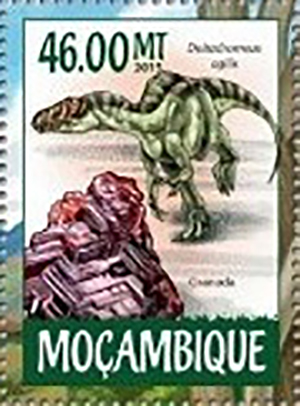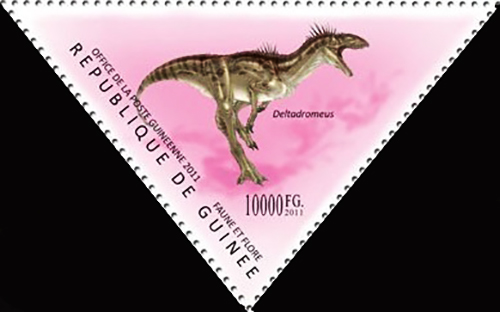Deltadromeus agilis Sereno et al., 1996

(Da: it.wikipedia.org)
Phylum: Chordata Haeckel, 1874
Subphylum: Vertebrata Cuvier, 1812
Classe: Dinosauria Owen, 1841
Ordine: Saurischia Seeley, 1887
Famiglia: Neovenatoridae Benson, Carrano & Brusatte, 2010
Genere: Deltadromeus Sereno et al., 1996
Descrizione
Lo scheletro più completo di Deltadromeus misura circa 8 metri di lunghezza, si stima che l’animale raggiungesse le 2 tonnellate di peso. Un secondo esemplare è stato descritto da Ernst Stromer come Bahariasaurus (che prende il nome dal luogo di ritrovamento), ma è stato reinterpretato come Deltadromeus da Paul Sereno nel 1996. Questo secondo esemplare risulta essere più grande del primo, con un femore lungo circa 1.22 metri. Gli scheletri di Deltadromeus sono stati trovati anche nelle stesse formazioni dei grandi teropodi Africani quali Spinosaurus o Carcharodontosaurus.
Diffusione
I fossili sono stati rinvenuti nella Bahariya Formation, risalenti al Cretaceo Superiore, circa 95 milioni di anni fa.
Bibliografia
–Sereno Dutheil; Iarochene Larsson; Lyon Magwene; Sidor Varricchio; Wilson (1996). "Predatory Dinosaurs from the Sahara and Late Cretaceous Faunal Differentiation" (PDF). Science. 272 (5264): 986-991.
–Holtz, Thomas R. Jr. (2008) Dinosaurs: The Most Complete, Up-to-Date Encyclopedia for Dinosaur Lovers of All Ages Supplementary Information.
–Sebastián Apesteguía; Nathan D. Smith; Rubén Juárez Valieri; Peter J. Makovicky (2016). "An Unusual New Theropod with a Didactyl Manus from the Upper Cretaceous of Patagonia, Argentina". PLoS ONE. 11 (7): e0157793.
–Matías J. Motta; Alexis M. Aranciaga Rolando; Sebastián Rozadilla; Federico E. Agnolín; Nicolás R. Chimento; Federico Brissón Egli & Fernando E. Novas (2016). "New theropod fauna from the Upper Cretaceous (Huincul Formation) of northwestern Patagonia, Argentina". New Mexico Museum of Natural History and Science Bulletin. 71: 231-253.
–Porfiri, Juan D; Juárez Valieri, Rubén D; Santos, Domenica D.D; Lamanna, Matthew C (2018). "A new megaraptoran theropod dinosaur from the Upper Cretaceous Bajo de la Carpa Formation of northwestern Patagonia". Cretaceous Research. 89: 302-319. doi:10.1016/j.cretres.2018.03.014.
–Seebacher F (2001). "A new method to calculate allometric length-mass relationships of dinosaurs". Journal of Vertebrate Paleontology. 21 (1): 51-60. CiteSeerX 10.1.1.462.255.
–Stromer (1934). "Ergebnisse der Forschungsreisen Prof. E. Stromers in den Wüsten Ägyptens." II. Wirbeltierreste der Baharije-Stufe (unterstes Cenoman). 13. Dinosauria. Abh. Bayer. Akad. Wiss., Math.-Nat. Abt., (n. s.) 22 1-79, 3 pls.
–Mortimer, Mickey (September 17, 2014). "No giant Egyptian Deltadromeus". The Theropod Database Blog.
–Wilson Sereno, Srivastava Bhatt, Khosla , Sahni (2003). "A new abelisaurid (Dinosauria, Theropoda) from the Lameta Formation (Cretaceous, Maastrichtian) of India". Contr. Mus. Palaeont. Univ. Mich. 31: 1-42.
–Carrano , Sampson (2008). "The Phylogeny of Ceratosauria (Dinosauria: Theropoda)". JSysPaleo. 6 (2): 183-236.
–Xu X.; Clark J.M.; Mo J.; Choiniere J.; Forster C.A.; Erickson G.M.; Hone D.W.E.; Sullivan C.; Eberth D.A.; Nesbitt S.; Zhao Q.; Hernandez R.; Jia C.-K.; Han F.-L.; Guo Y. (2009). "A Jurassic ceratosaur from China helps clarify avian digital homologies" (PDF). Nature. 459 (18): 940-944.
–Rauhut, O.W.M., and Carrano, M.T. (2016). The theropod dinosaur Elaphrosaurus bambergi Janensch, 1920, from the Late Jurassic of Tendaguru, Tanzania. Zoological Journal of the Linnean Society.
–Wang, S.; Stiegler, J.; Amiot, R.; Wang, X.; Du, G.-H.; Clark, J.M.; Xu, X. (2017). "Extreme Ontogenetic Changes in a Ceratosaurian Theropod" (PDF). Current Biology. 27 (1): 144-148.

|
Data: 15/06/2015
Emissione: Storia della fauna Stato: Mozambique |
|---|

|
Data: 30/08/2011
Emissione: Dinosauri Stato: Guinea |
|---|